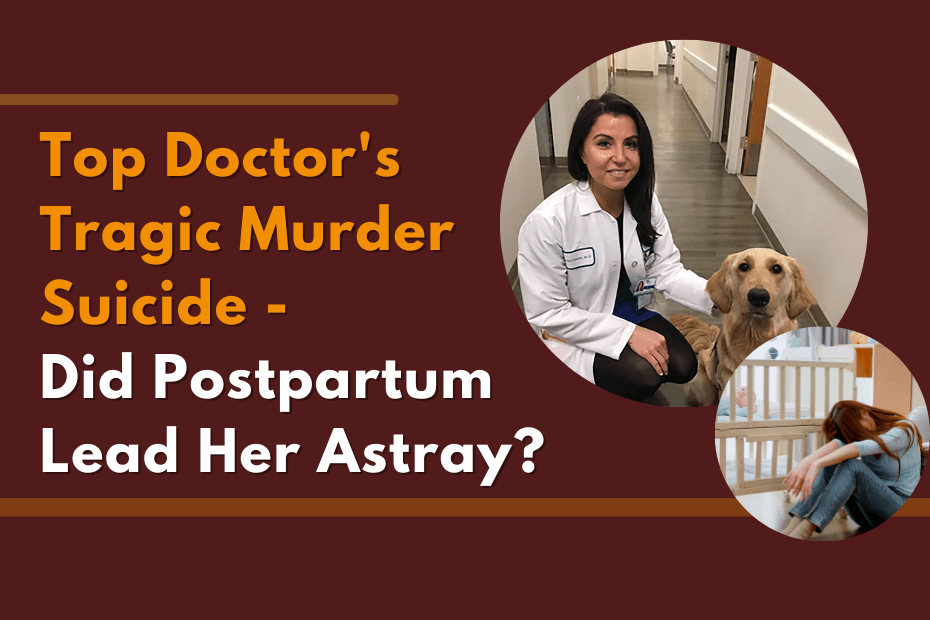Dr. Cascetta, a successful breast-cancer researcher at Mount Sinai Hospital in Queens, may have had post-partum depression, according to friends.
Research suggests a New York City doctor who shot her baby daughter before killing herself had postpartum depression. The sad murder-suicide of eminent oncologist Dr. Krystal Cascetta and her four-month-old daughter has shaken Somers.

Dr. Cascetta, 40, is an assistant professor of hematology and oncology at Mount Sinai’s Icahn School of Medicine and site chief of the Queens Infusion Center. News said that postpartum depression may have caused the tragedy.
20% of mothers experience postpartum mental health issues.
Postpartum depression or psychosis may have contributed to Dr. Cascetta’s unfortunate outcome.
Postpartum depression can include mood changes, trouble bonding with the newborn, withdrawal from loved ones, and other symptoms in the weeks after childbirth.
Postpartum psychosis is rare and severe.
It causes hallucinations, delusions, and possibly self-harm or harm to the baby.
Before murder-suicide, the top doctor called the police twice.
After two calls to the police, a top doctor shot and killed her four-month-old baby and then herself. Dr. Krystal Cascetta, 40, and her kid were found dead at her New York home Saturday morning after her parents contacted 911.
“A preliminary investigation revealed that at approximately 7am, Krystal Cascetta entered her child’s room, shot her baby, and then turned the gun on herself,” police added.
The scene suggests murder/suicide. Mount Sinai Hospital oncologist Dr. Krystal Cascetta was well-known.” Neighbors told police visited her home twice in recent months.
At this point, we don’t know why the cops are visiting, and neighbors say the family is very private.
“They came over and introduced themselves when they moved in about two years ago, and then we never heard from them again,” stated a Somers, New York resident. We didn’t know she was pregnant.”
Another said, “Our dog Bruno just started going wild at 6:45. “I woke up to the dog freaking out and figured he really had to go out, so I took him out for a walk, and that’s when the police and EMS and everybody rolled up.”
Dr. Cascetta’s parents were home during the incident. Trooper Steven Nevel said a resident called 911 after hearing the first gunshot and investigating the baby’s room.
Nevel confirmed that the anonymous caller heard a second gunshot before entering the room, broke down the door, and found the dead mother and baby inside.
Who Was Cascetta?
Dr. Cascetta and her husband had lived in a $1 million home in the Granite Springs neighborhood of Somers, New York.
On his Instagram page, he posted pictures of the two of them in Austin, Texas, where Dr. Cascetta had come to see him when they were just getting to know each other.
The two got married in 2019 at a party in Greenpoint, Brooklyn, after something Talty called “so special” on social media. Posts on social media say that the baby was born in March.
According to her bio on the Mt. Sinai website, Dr. Cascetta got her medical degree from Albany Medical College, where she won an award for how kind she was to her patients.
What Really Postpartum Depression Is?
Postpartum depression (PPD) is a mental health problem that some women have after giving birth. It is a type of depression that happens in the first year after giving birth. It can cause a wide range of social, mental, and physical symptoms.
PPD is different from the “baby blues,” which are short-term mood swings many new moms have after giving birth because of hormone changes.
PPD is marked by strong, long-lasting feelings of sadness, worthlessness, and worry that can make it hard for a person to care for themselves and their baby.
Some of the signs of PPD are:
Depressed Mood
Feeling overwhelmingly sad, hopeless, or emotionally numb.
Loss of Interest or Pleasure
Losing interest in previously enjoyable activities.
Fatigue
Experiencing extreme tiredness, even when rest is taken.
Changes In Sleep Patterns
Having trouble falling asleep, staying asleep, or sleeping excessively.
Changes In Appetite
Experiencing changes in appetite and weight, either eating significantly more or less than usual.
Difficulty Concentrating
Struggling to focus, make decisions, or remember things.
Feelings of Guilt or Worthlessness
Experiencing intense self-criticism or a sense of inadequacy.
Anxiety
Feeling excessively worried, agitated, or having panic attacks.
Irritability
Being easily agitated or getting frustrated more frequently.
Physical Symptoms
Experiencing physical symptoms like headaches, stomach problems, or muscle pain.
Krystal Cascetta’s devastating postpartum depression story could start a movement. It urges us to rethink our views, destigmatize mental health issues, and assist our mothers. Krystal’s story reminds us that beyond the clickbait headlines and picture-perfect posts, we’re all people.
- What to Pack for 30-Day Rehab? FREE Checklist - May 30, 2024
- Types of Outpatient Rehab: Difference One Should Know - March 28, 2024
- Truth Behind FMLA: Hidden Hurdles of Alcohol Rehab Leave - March 28, 2024